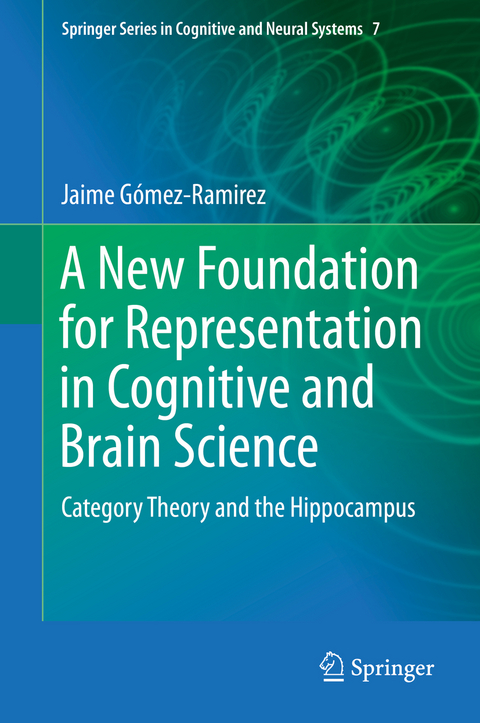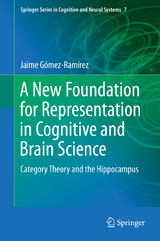A New Foundation for Representation in Cognitive and Brain Science
Category Theory and the Hippocampus
Seiten
A New Foundation for Representation in Cognitive and Brain Science
The purpose of the book is to advance in the understanding of brain function by defining a general framework for representation based on category theory. The idea is to bring this mathematical formalism into the domain of neural representation of physical spaces, setting the basis for a theory of mental representation, able to relate empirical findings, uniting them into a sound theoretical corpus.
The innovative approach presented in the book provides a horizon of interdisciplinary collaboration that aims to set up a common agenda that synthesizes mathematical formalization and empirical procedures in a systemic way. Category theory has been successfully applied to qualitative analysis, mainly in theoretical computer science to deal with programming language semantics. Nevertheless, the potential of category theoretic tools for quantitative analysis of networks has not been tackled so far. Statistical methods to investigate graph structure typically rely on network parameters. Category theory can be seen as an abstraction of graph theory. Thus, new categorical properties can be added into network analysis and graph theoretic constructs can be accordingly extended in more fundamental basis. By generalizing networks using category theory we can address questions and elaborate answers in a more fundamental way without waiving graph theoretic tools. The vital issue is to establish a new framework for quantitative analysis of networks using the theory of categories, in which computational neuroscientists and network theorists may tackle in more efficient ways the dynamics of brain cognitive networks.
The intended audience of the book is researchers who wish to explore the validity of mathematical principles in the understanding of cognitive systems. All the actors in cognitive science: philosophers, engineers, neurobiologists, cognitive psychologists, computer scientists etc. are akin to discover along its pages new unforeseen connections through the development of concepts and formal theories described in the book. Practitioners of both pure and applied mathematics e.g., network theorists, will be delighted with the mapping of abstract mathematical concepts in the terra incognita of cognition.
The purpose of the book is to advance in the understanding of brain function by defining a general framework for representation based on category theory. The idea is to bring this mathematical formalism into the domain of neural representation of physical spaces, setting the basis for a theory of mental representation, able to relate empirical findings, uniting them into a sound theoretical corpus.
The innovative approach presented in the book provides a horizon of interdisciplinary collaboration that aims to set up a common agenda that synthesizes mathematical formalization and empirical procedures in a systemic way. Category theory has been successfully applied to qualitative analysis, mainly in theoretical computer science to deal with programming language semantics. Nevertheless, the potential of category theoretic tools for quantitative analysis of networks has not been tackled so far. Statistical methods to investigate graph structure typically rely on network parameters. Category theory can be seen as an abstraction of graph theory. Thus, new categorical properties can be added into network analysis and graph theoretic constructs can be accordingly extended in more fundamental basis. By generalizing networks using category theory we can address questions and elaborate answers in a more fundamental way without waiving graph theoretic tools. The vital issue is to establish a new framework for quantitative analysis of networks using the theory of categories, in which computational neuroscientists and network theorists may tackle in more efficient ways the dynamics of brain cognitive networks.
The intended audience of the book is researchers who wish to explore the validity of mathematical principles in the understanding of cognitive systems. All the actors in cognitive science: philosophers, engineers, neurobiologists, cognitive psychologists, computer scientists etc. are akin to discover along its pages new unforeseen connections through the development of concepts and formal theories described in the book. Practitioners of both pure and applied mathematics e.g., network theorists, will be delighted with the mapping of abstract mathematical concepts in the terra incognita of cognition.
Preface.- Research tools and paradigms.- State of the Art: Mathematical approaches in brain science.- The Categorical Imperative: Category theory in Cognitive and Brain Science.- Elementary principles in cognitive systems modeling.- The shift towards structure.- A general framework for representation.- Towards a Theory of Brain Structure and Function.- A theory of hippocampus structure and function based on Category Theory.- From Cells to Memories. A Categorical Approach.- Epilogue.
| Erscheint lt. Verlag | 9.12.2013 |
|---|---|
| Reihe/Serie | Springer Series in Cognitive and Neural Systems ; 7 |
| Zusatzinfo | 40 Illustrations, color; 33 Illustrations, black and white; XXIII, 193 p. 73 illus., 40 illus. in color. |
| Verlagsort | Dordrecht |
| Sprache | englisch |
| Maße | 155 x 235 mm |
| Themenwelt | Geisteswissenschaften ► Philosophie |
| Geisteswissenschaften ► Psychologie ► Biopsychologie / Neurowissenschaften | |
| Informatik ► Theorie / Studium ► Künstliche Intelligenz / Robotik | |
| Mathematik / Informatik ► Mathematik ► Allgemeines / Lexika | |
| Medizin / Pharmazie ► Medizinische Fachgebiete ► Neurologie | |
| Medizin / Pharmazie ► Studium | |
| Naturwissenschaften ► Biologie ► Humanbiologie | |
| Naturwissenschaften ► Biologie ► Zoologie | |
| ISBN-10 | 94-007-7737-X / 940077737X |
| ISBN-13 | 978-94-007-7737-8 / 9789400777378 |
| Zustand | Neuware |
| Informationen gemäß Produktsicherheitsverordnung (GPSR) | |
| Haben Sie eine Frage zum Produkt? |
Mehr entdecken
aus dem Bereich
aus dem Bereich
Eine kurze Geschichte der Informationsnetzwerke von der Steinzeit bis …
Buch | Hardcover (2024)
Penguin (Verlag)
28,00 €
Buch | Softcover (2024)
REDLINE (Verlag)
20,00 €




